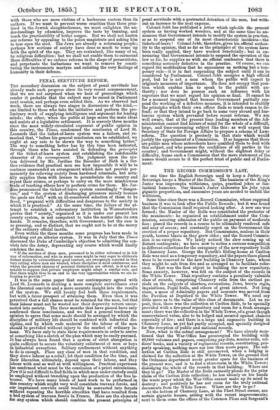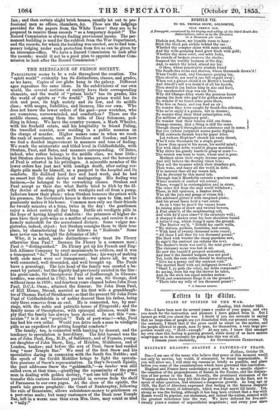THE RECORD COMMISSION'S LAST.
Ax one time the English Sovereign used to keep a Jester; our Sovereign keeps a Master of the Rolls. The business of the King's Jester was impromptu witticisms, quips, practical jokes or fan- tastical humours. Our Queen's Jester elaborates his joke upon gigantic proportions, and successive years are needed to unfold the witticism.
Some time since there was a Record Commission, whose supposed business it was to look after the Public Records ; but it was found that the Commission itself required looking after. A new one was formed; the Muter of the Rolla was constituted the protector of the muniments : he organized an establishment under the Com- mission, securing admission of the public on payment of moderate fees; placed the records in a course to be ultimately rendered safe and easy of access ; and constantly urged on the Government the erection of a proper repository. But Commissions, zealous in their youth, become blases as they grow older • and the Record Commis- sion is no exception. We lotely noticed the slow coming up of distant contingents ; we have now to notice a curious-competition in different collections for the occupancy of the new repository built in Chancery Lane. George the Fourth's Riding-house at Carlton Ride was used as a temporary repository, and the papers there placed were to be removed to the new building in Chancery Lane, where they might be safe from fire and so arranged as to facilitate refer- ence. That was the first object in building the new repository. Some anxiety, however, was felt on the subject of the records in the White Tower. That repository contains a peculiarly valuable class of records, comprising Chancery rolls from the earliest pe- riods on the subjects of charters, coronations, Jews, brevia rep** inquisitions, Papal bulls, and others of great interest. Not long since, a mass of Admiralty papers and accounts was moved from the Pavilion at Deptford to the White Tower. We need say little more as to the value of this class of documents. Let us re- peat, then, there was the collection at Carlton Ride, to be specially provided with a fire-proof repository and room for a fresh arrange- ment; there was the collection in the White Tower, of a great thqugh unascertained value, also to be lodged and secured against chances especially of fire ; and there is a large and expensive building in Chancery Lane, as yet but partly occupied, and specially designed for the reception of public and national records. Now, what is the actual arrangement? We have already men- tioned that the War-Office has preoccupied the building with 40,000 volumes and papers, comprising pay-lists, muster-roll., sol- diers' books, and a variety of regimental records, constituting, pro- perly speaking, nothing more nor less than waste paper. The col- lection at Carlton Ride is still anrenroved, when a lodging is claimed for the collection at the White Tower, on the ground that the Ordnance department needs greater space for the business of the present war, and is to find a store-room in the White Tower; dislodging the whole of the records in that building. Where are they to go ? The Master of the Rolls earnestly pleads for the prior claim of the Carlton Ride collection ; he has already on his hands the waste paper which the War-Office cannot make up its mind to destroy ; and positively he has not room for the truly national documents from the White Tower. Where are they to go ?
At the bottom of Chancery Lane, at the Fleet Street corner, are certain gigantic houses, arising with the recent improvements; next to them come the offices of the Common Pleas and Sergeant's
Inn ; and then certain slight brick houses, usually let out to pro- fessional men as offices, chambers, &c. These are the lodgings provided for the papers from the White Tower ! they are to be prepared to receive these records " as a temporary deposit !" The Record Commission is always finding provisional means. The per- manent building is used for the rubbish from the War Department, and the records, for which the building was erected, are to find tem- porary lodging under such protection from fire as can be given by an insurance-office. We have a Record Commission to look after the records : would it not be a good plan to appoint another Com- mission to look after the Record Commission ?



































 Previous page
Previous page